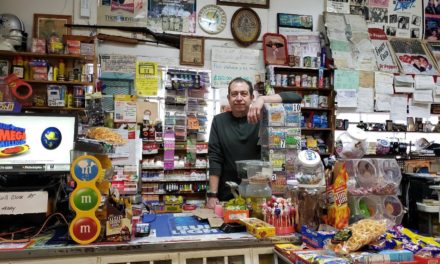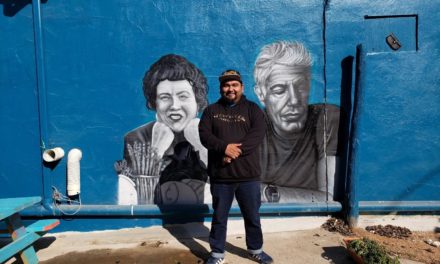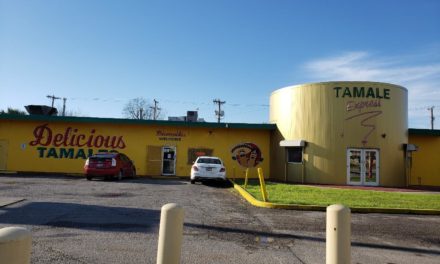Pointing across the street to the original Friedrich Air Conditioning building, César E. Chávez Legacy Educational Fund (CECLEF) Chair Ernest Martinez shows me where his father Jaime got his start as a spot welder before being recruited by IUE AFL-CIO. Eventually, Jaime Martinez rose through the ranks of the labor union eventually becoming the first Latino executive board member of an International labor union, ultimately representing 23 states west of the Mississippi. In 1966, he met César Chávez, a man who walked a similar path and would become a mentor and friend for life. César Chávez of course, was the Mexican American farmer worker, labor leader and civil rights activist who along with Dolores Huerta, co-founded the National Farm Workers Association in 1962 (which later became the United Farm Workers, (UFW), growing to represent field workers throughout the United States. Accomplishments of the UFW include:
Began first collective bargaining agreement between farm workers and growers in 1966;
Instituted first union contracts requiring rest periods, toilets in the fields, clean drinking water, hand washing facilities, protective clothing against pesticide exposure, banning pesticide spraying while workers are in the fields, outlawing DDT and other dangerous pesticides, lengthening pesticide re-entry periods beyond state and federal standards, and requiring the testing of farm workers on a regular basis to monitor for pesticide exposure;
Initiated first union contracts that eliminated farm labor contractors and guaranteed farm workers seniority rights and job security;
Established first comprehensive union health benefits for farm workers and families through UFW’s Robert F. Kennedy Medical Plan;
Created the first and only functioning pension plan for retired farm workers, the Juan de la Cruz Pension Plan;
Established the first functioning credit union for farm workers;
Began first union contracts regulating safety and sanitary conditions in farm labor camps, banning discrimination in employment and sexual harassment of women workers;
Started the first union contracts providing for profit sharing and parental leave;
Abolished the infamous short-handled hoe that crippled generations of farm workers;
Extended farm workers state coverage under unemployment, disability and workers’ compensation, as well as amnesty rights for immigrants and public assistance for farm workers (https://ufw.org/ufw-successes-years/)
When César Chávez passed away in 1993, Jaime announced, “we have to do something for César here in San Antonio” and with the blessing of the Chávez family and the work of just five to ten thoughtful volunteers, the César Chávez March for Justice was created. The first César Chávez March for Justice march was held in 1997 with less than 100 participants. Today, the march boasts approximately 10-15k demonstrators, which Ernest tells me is an even higher turnout than in California, Chávez’s home state.
Now in its 23rd year, the “César Chávez March for Justice” is finally the getting the support it deserves with free VIA Metropolitan Transportation bus rides available for march attendees, due to the combined efforts of Ernest Martinez, support from Texas State Representative 125 Justin Rodriguez and Bexar County Precinct Four County Commissioner Tommy Calvert. Free transportation to and from the march means that attendee numbers are expected to grow as they did when VIA began providing free trips to and from the MLK march, which also encouraged other entities to participate and contribute as corporate citizens.
But the march isn’t the only initiative in César’s name. There’s also the César E. Chávez Legacy and Educational Fund Scholarship, which provides annual scholarships to students who exude the “Si Se Puede” spirit in school, by making good grades, which “don’t have to be perfect” but could “use the extra push” of support. There’s also the “Thanksgiving in the Barrio”, recently renamed the “Jaime P. Martinez Annual Thanksgiving in the Barrio” created to address hunger in the community. The initiative that began by providing a dozen families a frozen turkey and trimmings each for Thanksgiving (a week before the holiday so that they could prepare dinner for their family), now feeds over 325 annually. Ernest says the need for this service is growing every year, with many coming to request assistance in the bitter cold under-dressed and desperate. The need for these services echo the U.S. Census Bureau Statistics showing that San Antonio has a higher than national average numbers for people living in poverty (19% versus 12%), with disabilities (11% versus 9%), without health insurance (19% versus 10%) and who live with a lower median income (49k versus 57k), (US Census, 2016). As such, there is also an ongoing effort to collect food. This year’s advertising campaign for the César Chávez March for Justice is the Warholesque “Campbell’s soup can” reimagined with César’s face with slogan that reads “Yes We CAN” – which is a fresh, identifiable reminder to indeed, bring at least 1-2 cans of food to the march. The goal is to get 15,000 lbs. of food from the anticipated 15,000 or more marchers.
During the interview, Ernest gets a text from the “Beto for President” campaign about getting Beto to the march and tells me that often politicians are irked that they are asked to not be in the front of the march with their banners and reminded to stay on message related to farm workers, education and hunger. That pleases me to no end. Because the CECELF is a 501©3, it is a nonpartisan nonprofit and cannot demonstrate any favor to any side of the spectrum. Ernest notes that both sides of the political continuum have held power and neither have made any progress on issues of labor or immigration, a sentiment I wholeheartedly agree with. Although there are photos of US presidents, actors supporting the cause and Geraldo. But more important messages of “Save Immigrant” and “No More Deportations” and “Families” and a portrait of “Farm Worker Martyrs” that were killed during the struggle. There’s a mural by a labor activist that shows Chicanos protesting for “Working Conditions; Pension; Insurance; Benefits; Wages; Unfair Labor Practices…Sweatshop Conditions”, all still evident today – the UFW lists its current priorities:
Human Trafficking in Agricultural Industries
Farmworkers on the Frontlines of Climate Change (CA Wildfires, etc.)
Pesticides and Right to Organize
CA Overtime
Immigration “Blue Card” (agricultural workers path to citizenship)
Darigold (Starbucks source for dairy) (https://ufw.org/organizing/key-campaigns/)
Farming is one of the few industries in which family members (who often share work and live on the premises) are also at risk for injuries associated with agriculture (which is listed among the most hazardous of industries that put workers at significant risk for fatal and nonfatal injuries), as well as pesticide exposure, pulmonary disease, musculoskeletal disorders, hearing loss, and stress. As an example, my Mom picked cotton part-time in Alice, Texas in the mid to late 50s with her family from about the age of 10 to 14 to make extra money with her family. She and her siblings were children, often carrying sacks 40-50 lbs. of cotton that would be weighed at the end of the day. The adults would carry more – hundreds of pounds. The worst thing aside from the sun, was “that was that we all had to drink water from water from the same wooden ladel,”my mother Rosa Fernández, active today as an artist and retired elementary school teacher, told me. The daughter of a construction worker father and homemaker-seamstress mother, her earnings were used to save money to buy fabric to make clothes for the school year with her mother, who as an adult, bore most of the back-breaking work with my Grandfather, as well as the sun’s penetrating rays. “We spent a lot of time under the truck because the sun was unbearable,” she told me, which is likely why my Grandmother got skin cancer later in life. This says a lot about even the minimal impact of part-time work, compared to what full-time farm workers are forced to endure.
And even though the story from my family is dated, from the food on our plates to the fabric we wear every day, we are connected to farm workers (and workers in general). And we should remember that the César Chávez March for Justice is just that, a march asking for change, on behalf of people like my Grandparents and mother (there are child laborers), not a parade memorializing fallen leaders from the past providing a colorful backdrop for a politician’s photo-op. As Latinos, we are underpaid, undervalued and over-worked as workers. We are least likely to graduate high school or college as students and as an ethnic group, our history is being erased at state and national levels from educational curriculum. We have consistently been and continue to be used as political pawns by the racist and corporate classes and election 2020 is barely upon us. So, make sure you go with your signs that stretch the limits of free speech and keep any politician looking for a shameless photo-ops away from the main television cameras. Nunca Olvida La Causa!
The César Chávez March for Justice is takes place on Saturday, March 30th at 10:00 AM along Brazos and Guadalupe Cultural Arts Center at 723 S. Brazos. Bring your signs and hitch a free ride from VIA – pickups are from UTSA Downtown Campus at Parking Lot off Dolorosa/Pecos-Trinidad & Alamodome Lots B & C, off Cherry Street. Service starts 8AM and march starts at 10AM. Return Service is from E. César Chávez, between Towers of America Way, at Gate 4 at the Institute of Texan Cultures, after 3pm.
VIA to Give Free Rides to César Chávez March for Justice Demonstrators












